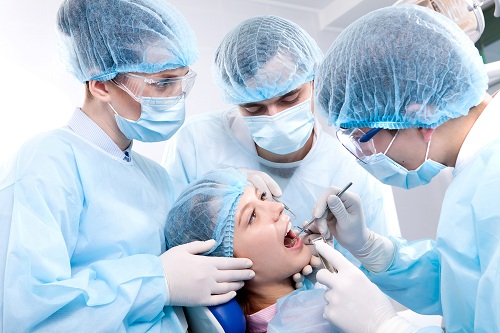We're supporting our patient with resources to stay safe and informed.

Oral Surgery
Here are some definitions of key dental terms to help you become more familiar with dentistry and the services we provide at our offices:

Extraction
-
It is the removal of a tooth from its supporting bone structure under local/general anesthesia.
Alveoplasty
-
It is the shaping of the bone without removing the supporting bone to facilitate seating of a denture and reducing discomfort for the patient.
Biopsy
-
It is the surgical removal of a small part or the whole diseased lesion in the mouth (excisional/incisional biopsy) done for examining the lesion under microscope.
Incision and Drainage
-
It is a procedure done to mostly drain out an abscess due to infection. A small cut is made at the peak of the soft tissue swelling to facilitate draining of the pus from the abscess.
Lesion Evaluation
-
It is the evaluation of intra and extra oral hard and soft tissue with the help of dental instruments and other aids like lnfra red rays.
Exposure
-
It is the removal of hard/soft tissue from over the crown of an unerupted tooth to facilitate its natural eruption.
Hard Tissue
-
It comprises of the bone and tooth in the mouth.
Infection
-
It is the pathological state resulting from the invasion of the body by pathogenic microorganisms.
Expose and Bond
-
It is the placement of an orthodontic bracket/button after the surgical exposure of the clinical crown to force erupt the tooth through the hard and soft tissue.
Soft Tissue
-
It comprises of the gingivae, muscles including tongue, buccal mucosa, and palatal tissue in the mouth.
Frenectomy
-
It is the surgical removal of the muscle fibers from the periosteum mostly between the upper two central incisors to facilitate their movement together.
Cleft Lip & palate
-
It is the non-union of the right and left maxillary shelves at the time of pre-natal development. It could be bilateral or unilateral
TMJ
-
It is a ball and socket joint that connects the mandible to the maxilla at the glenoid fossa.
Facial Surgery
-
This is an umbrella term used to describe various different extra oral surgeries to facilitate the functional and esthetic appearance of a patient.
Anesthesia
-
It is a pharmacologically induced and reversible state of amnesia, analgesia, loss of responsiveness, loss of skeletal muscle reflexes or decreased stress response, or all simultaneously. This allows patients to undergo surgery and other procedures without the distress and pain they would otherwise experience.
Sedation
-
It is the reduction of irritability or agitation by administration of sedative drugs, generally to facilitate a medical procedure or diagnostic procedure.
Nitrous Oxide
-
Commonly known as laughing gas is a chemical compound with the formula N2O. It is an oxide of nitrogen. At room temperature, it is a colorless non-flammable gas with a slightly sweet odor and taste. It is used in surgery and dentistry for its anesthetic and analgesic effects. It is known as "laughing gas" due to the euphoric effects of inhaling it, a property that has led to its recreational use as a dissociative anesthetic.


